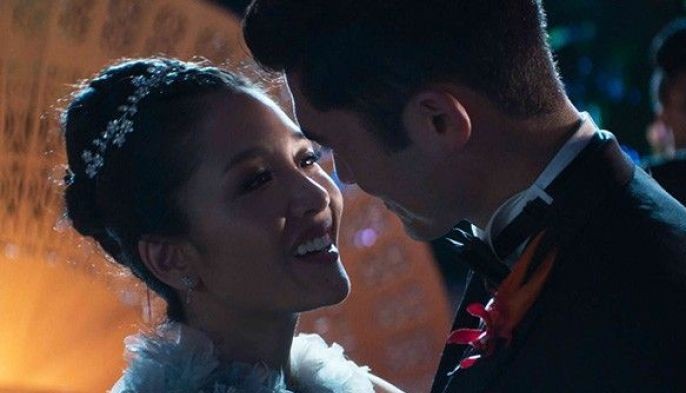Nori Koizumi makes movies about time and belief

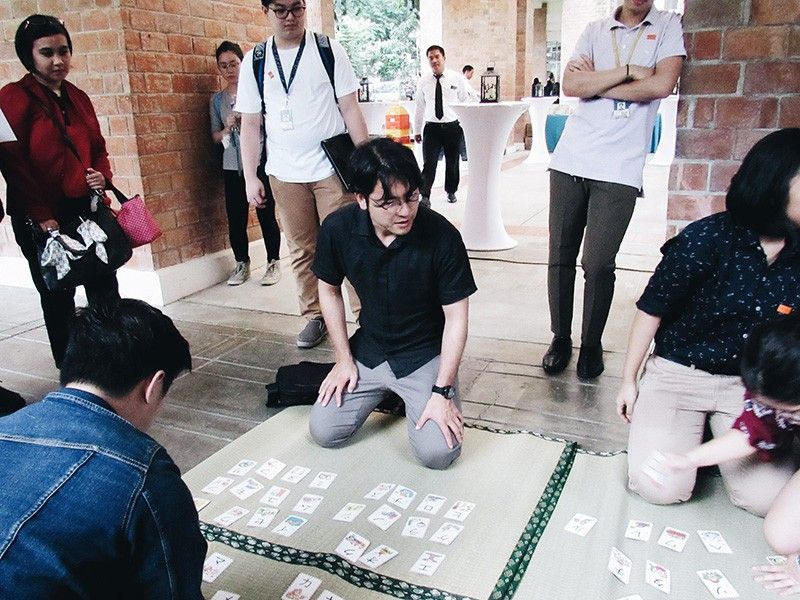
Thirty-seven-year-old filmmaker Nori Koizumi would humbly confess, “I’m not good in karuta,” but would play with you anyway.
At 4 p.m. in Ateneo, he is on his knees with cards in front of him, opposite a student intent on beating him at his game. Karuta does curious things to its players: one moment, they seem to be in solemn meditation; the next, they are pouncing and snatching cards with enchanted speed and frenzy. The crowd gathered outside Escaler Hall cheers in Japanese. “Bakit walang subtitles?” one student quips. Someone else mumbles, “That guy’s the director of Chihayafuru.”
Koizumi has flown to Manila for this year’s Japanese Film Festival, where the three installments of his film Chihayafuru are among the highlights. A talk and a screening of the final movie was held last July 6 in Ateneo, part of the Japan Foundation’s initiatives to bring Japanese cinema and culture closer to the Filipino audience.
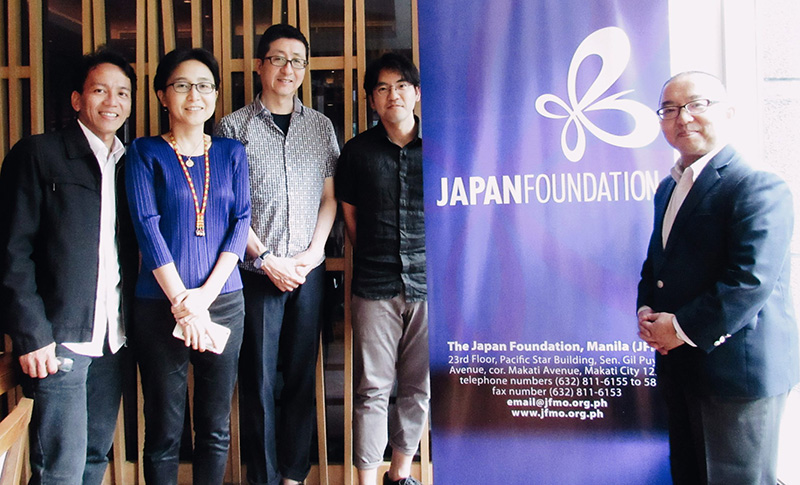
The Japan Foundation continuously seeks to provide programs and platforms that bring Japanese culture closer to Filipinos: (From left) Rolando Samson, Ami Kurokawa, Masafumi Konomi, filmmaker Nori Koizumi and Japan Foundation Manila director Hiroaki Uesugi.
Based on a manga by Yuki Suetsugu, Chihayafuru is well-loved for how it captures the exciting game of karuta. “It was the poems (that made me want to direct),” says Koizumi. “It’s a card game but it has meanings in the card and it has history, Japanese history. That’s what makes it different from other sports movies.”
The film revolves around three characters: Chihaya, the passionate card player hell-bent on becoming the karuta queen; Arata, a karuta prodigy (or, in other words, a cute card geek); and Taichi, who neither has the talent nor the same crazed interest for the game yet plays it just as obsessively. “Taichi reminds me of myself,” says Koizumi.
Like in a game, the director learns as he plays. Far from resembling the archetype of a child prodigy, Koizumi didn’t grow up with a fierce reverence for cinema. “I wasn’t a movie freak. I wasn’t (worshipping) Kurosawa,” he says. “To me, it was a craft.” His affair with films began with a simple high school assignment — “there was this weird teacher telling us to do a movie project” — and continued as he joined the production company Robot Communications after college graduation.
He also talks of screenwriting as though he accidentally stumbled upon the craft. “No one was there to write for me so I just made it myself,” says Koizumi. “There’s a lot of talented writers in the industry, but I feel like myself, I’m not that yet,” he tells me, and I wonder if this young, prolific director — who can easily pass off as a friendly schoolboy in his films — ever runs out of these humble confessions.
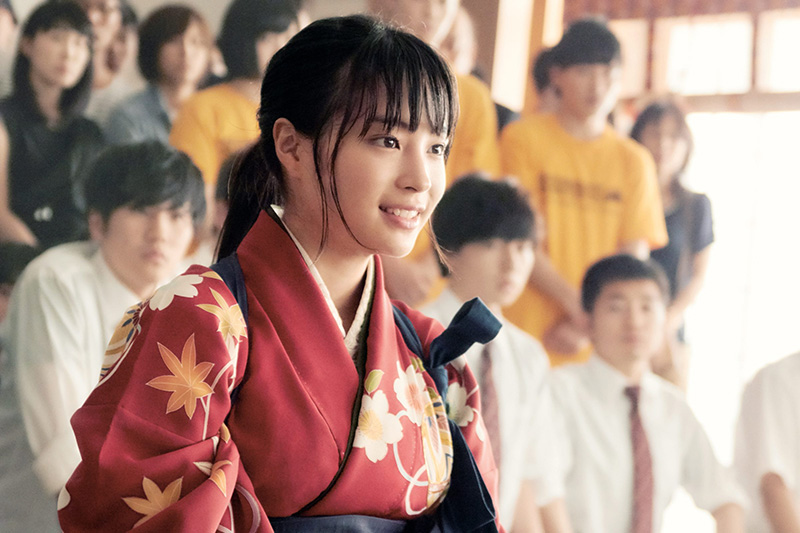
Director Nori Koizumi is known for spotting and casting emerging young talents. Suzu Hirose debuts in her first leading role as Chihaya Arase.
His works are often seen as coming-of-age films and stories of people with difficult, if not absurd, conditions. In his feature film debut, Taiyo no Uta (2006), a girl’s skin disease keeps her from being exposed to the sun. In Gachi Boy, Wrestling with a Memory (2008), a student wrestler struggles with amnesia. Both received commercial and critical acclaim, the former earning 1.1 billion yen at the box office, and the latter winning the grand prize in the 10th Udine Far East Film Festival, ranking him among Japan’s most promising directors.
When I ask him about the thematic current that connects his films, he puts it in another way. “(I’m attracted to stories) about time and belief.” In Chihayafuru, it’s easy to feel that this obsessive playing frenzy is indeed coming from a spiritual force. The passionate Chihaya enters karuta as one enters a religion, and Taichi talks about losing a game, as though being “abandoned by the gods.” “It’s very Japanese,” Koizumi continues. “Belief, (to us), is everywhere. When you believe something, you actually change the world surrounding you. That’s something I want to show in a movie.”
The main artistic challenge, for him, is how to communicate these things in a way that isn’t too didactic. “I think, if you want to preach, or show an artistic (idea) to people, first you have to entertain and then say what you want to say.” One member of the press agrees and says in jest, “When you see a film poster, you can immediately tell that it’s Marxist, so you know it’s going to be boring.” It’s the approach Koizumi consciously tries to avoid. What he wants, ultimately, is to make films “at the midpoint of art and entertainment.”
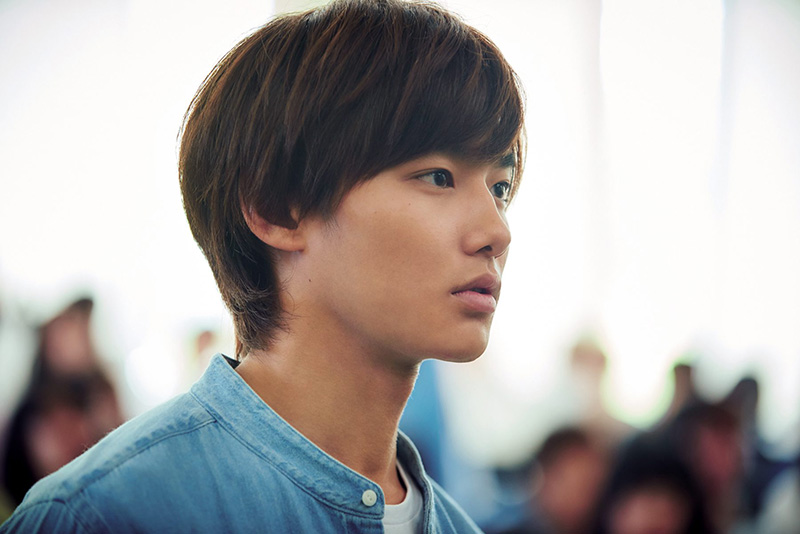
Shuhei Nomura plays Taichi.
In Chihayafuru, belief, history, and tradition are all at play, but they never overpower. Instead, what pulls us in are the gags, the music, and the bond between the characters. Notwithstanding his self-confessed and so-called lack of talent, Koizumi has a screenwriter’s obsession with figuring out the whys of his characters, almost as though they were his own. I ask, “If karuta is Taichi’s weakness, why does he keep chasing it if he can chase other things?” He laughs. “He likes Chihaya. And he’s confronting Arata, the only thing he can’t defeat,” he says. “If he runs away from the past, he will run away from everything.”
I remember his thoughts on time and belief, and at some point, I get confused as to whether he’s talking about the character or its director. “Who wins or who loses is not the important part for the movie,” he says, “It’s about how you face what you don’t have, how you face destiny or fate, how you overcome your weakness. With that point of view, I had to make Taichi the storyteller.”

















